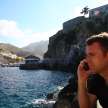The Gun That Changed the World
The Gun That Changed the World

Nobody comes here
Not by choice. Sometimes, a bus full of school kids will pull up outside. The young minds of the future will be forced through the echoing halls like toothpaste through a tube, counting the hours until they can escape.
But I’m a student of history and a man of obscure tastes. I often end up in places like these. Feeling a vague sense of pity for the dull-eyed docent who hands me my ticket, one of only a handful they’ll distribute that day. Museums are the vegetables of our culture, the leafy greens we swallow because someone once told us that they’re good for us.
But I’m a vegetarian. I like these kinds of places. I like them even better when I’m the only one there.
One of the best parts of travel is never quite knowing what will grab you.
I was predisposed to like Vienna. I like music. I like history. I like cities full of grand buildings and excellent public transit systems. But I came to Vienna by a strange path, a tourist trip with an ulterior motive. I was researching a novel I still haven’t written.
And this is one of the best parts of writing fiction, too. It can make things mean more.
Probably I would’ve liked Vienna anyway. There’s lots to like, especially in December. Christmas markets shine like sparking constellations between monuments, and the smell of mulled wine dances on the frozen air. But because I was seeing it through the eyes of a fictional character, I fell for the place even harder than I would have.
That’s what brought me to the Museum of Military History. The Heeregeschictliches Museum, as it’s known in German, is tucked away from Vienna’s historic heart. It’s located on a sprawling complex of military buildings constructed on the order of the Kaiser Franz Joseph I in 1850.
But Wikipedia can tell you all that. What it can’t tell you about is the low gray sky that hung above the battlements when I visited, the red brick building seeming to scowl across an empty parking lot dotted with naked trees. It can’t help you see, the way I want you to see, the startling interior of the building. The marble statues and golden halls, the grand palace built to house the glorious relics of a vast empire that no one could have known at the time was soon to vanish forever.
On the grand staircase that ascended from the entrance hall, a marble bust of Franz Joseph I with his trademark muttonchop whiskers stared blindly at me as I passed. For a man who died over a hundred years ago, he’s everywhere. The same slightly distracted face I saw on shot glasses in Slovenia, on the cover of books in Paris.
Franz Joseph the First wasn’t quite the last Emperor of Austria-Hungary, the final scion of a long line of Habsburg rulers that shaped the course of European history for hundreds of years. But it makes for a better story if we imagine that he was.
Don’t worry.
I’m not going to take you through the museum with me. Not everyone has the same interest in these things that I do.
My wife had already opted out. In all those gilded and echoing halls, I saw a few men and only one woman. Cannons and armor and medals get tiresome.
The sword of Radetzky and the death mask of the Emperor of Mexico are fascinating if you’re into that kind of thing, and duller than a tax return if you’re not. These artifacts are the priceless relics of a vanished world, swept away by one brutal war after another. But there’s no one left alive who remembers the old Empire. And you’re under no obligation to care about a world that was never yours.
In one vast hall after another, only my footsteps disturbed the dusty silence. And as I wandered through meticulously maintained displays that mean less to anyone with each passing year, a strange thought occurred to me.
This is what it’s like inside my head.
For a married man, I spend a lot of time alone, and inside the unimpressive dome of my skull, it’s one echoing hallway after another. Glass cases containing treasures that mean nothing to anyone but me. Wide windows looking out onto the sky.
It’s a strange feeling to stand somewhere you’ve never been and experience the uncanny resonance of the familiar. We all love the jewellike sea of Hawaii or the rainy streets of Paris, decked out with fallen leaves. But often, it’s not those things that touch us most deeply. Not the Eiffel Tower, but the unassuming cafe in the next arrondissement where the waiter was unexpectedly kind to you. Not the Colosseum, but the bright floral pattern on the headscarf of the woman begging on the steps of the church across the street.
Being somewhere new opens you up, makes you receptive to the world around you in the same way we all were as children, when we took nothing for granted. The world we thought we had lost, returned to us decked out in stained glass and gold leaf, shining in the low rays of the wintry sun as though it’s been waiting just for us.
In a dark hall in Vienna, the gun that changed the world sleeps.
Next to it, the tattered uniform of Franz Ferdinand still bears the bloodstains of the Archduke. Gavrilo Princip’s automatic pistol fired the first shots of a war that tore apart the empires that ruled the world.
The chaos that followed is the same chaos we live in today, an age of competing nation-states that only become more virulent in the teeth of their growing irrelevance.
And I was the only person there.
Hardly anybody cares anymore. Even when the story of the early 20th century has never seemed more relevant.
Part of the impetus of writing a novel set 100 years ago was to show the same patterns that are emerging. An empire collapsing from within. Politically-minded thugs brawling in the street. A virus sweeping the planet faster than anyone can contain it.
And all of us churning out comments and articles and thought pieces, the feuilletons of the Viennese coffeehouses reproduced as the clickbait of today. I could go on at length about this. Eighty thousand words and counting.
But that was what I expected to get from my visit to Vienna. What I didn’t anticipate was that winter light through the windows of the museum. That eerie hush that closed over my footsteps as I made my way through the echoing building. The way it would hit my heart in some unguessed place, blood rising to the surface in a patch of hot light.
The strange feeling of physically wandering through a space you’ve mapped a million times in a city you’ve never been to before.
Much is made of the cyclical nature of history, but nothing repeats itself perfectly. It’s the flaws in the reproduction of our cells that makes us age, turning a young soldier into a bald and white-whiskered Emperor, bereaved and alone. The times we live through will come around again, but never exactly the same.
In the preserved copies of Karl Kraus’ influential 1920s magazine Die Fackel, now kept under glass at the museum, you’ll find the same self-aggrandizing invective, the same smug word games you’ll find here. But the style was better back then.
And as I made my way through the final exhibit hall of the Museum, I heard a short-tempered attendant berating one of the only other visitors for taking photos without paying the €2 charge to use a camera. Even in my own mind, there are disagreements.
There are hidden perks to being a travel writer.
I’m not talking about the free hotel rooms I don’t get or the high-paying assignments no one’s going to offer me. I’m talking about the smaller things, the unexpected instances of serendipity that send the mind hurtling back through space and time to a trip taken long ago.
I was recently paid to write a guide to the Heeregeschictliches Museum, a brief compendium of practical information for English-speaking visitors. And as a good freelancer, that’s what I did.
But what I really wanted to write was this.
About the Creator
Ryan Frawley
Towers, Temples, Palaces: Essays From Europe out now!
Novelist, entomologist and cat owner. Ryan Frawley is the author of many articles and stories and one novel, Scar, available from online bookstores everywhere.






Comments
There are no comments for this story
Be the first to respond and start the conversation.